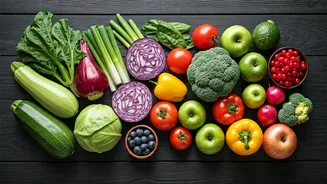Fatty Fish Power
Fatty fish, such as salmon, mackerel, and sardines, are packed with omega-3 fatty acids. These essential fats are potent anti-inflammatory agents that
can help to reduce inflammation associated with type 2 diabetes. In India, these fish can be a bit expensive, but look for affordable options at your local markets. Aim to include at least two servings of fatty fish in your diet each week. They can be baked, grilled, or added to curries, providing versatility in your meal planning and helping to boost your intake of beneficial omega-3s, which contribute to improved heart health and reduced disease risk.
Leafy Green Benefits
Leafy green vegetables are excellent sources of antioxidants, vitamins, and minerals that fight inflammation. Spinach, kale, and other greens contain compounds that can help to neutralize free radicals, which contribute to inflammation. In India, these vegetables are readily available. You can add them to your diet by including them in your salads or adding them to your daily meals, or use them in your vegetable curries. These greens are also low in calories and carbohydrates, making them ideal choices for managing blood sugar levels and promoting overall health. Embrace the inclusion of leafy greens in your diet for optimal results.
Berries for Better Health
Berries are rich in antioxidants, specifically anthocyanins, which give them their vibrant colors and also help reduce inflammation. They are also lower in carbohydrates compared to some other fruits. Incorporating berries, like blueberries, strawberries, and raspberries, into your diet can assist in improving insulin sensitivity and reducing overall inflammation. Although fresh berries might not always be accessible or affordable, consider using frozen berries in smoothies or adding them to your morning cereal. This is one of the easiest ways to get your fill of antioxidants and keep your diabetes in check.
Extra Virgin Olive Oil
Extra virgin olive oil is loaded with monounsaturated fats and antioxidants, such as oleocanthal, which has anti-inflammatory properties. It is a staple ingredient in the Mediterranean diet. When used in cooking, it can help lower the risk of heart disease and improve overall health. Use olive oil in your cooking or as a salad dressing. Replace other oils and fats with olive oil to get the most benefits. Its versatile nature allows it to be used in various cuisines, making it easier to incorporate into your Indian meals. Just a little goes a long way in terms of reaping health benefits, making this a great addition to your diet.
Nuts and Seeds Advantage
Nuts and seeds, such as almonds, walnuts, flaxseeds, and chia seeds, are packed with healthy fats, fiber, and antioxidants. These components work together to combat inflammation and improve heart health. In the Indian context, incorporate a handful of nuts and seeds as a snack or add them to your morning porridge or oatmeal. They can also be used in various recipes to add texture and nutrients. Their high fiber content aids in blood sugar control, while the healthy fats contribute to a balanced diet. Be mindful of portion sizes due to their calorie density, and always opt for raw or dry-roasted varieties over those with added sugars or salt.
Turmeric’s Curcumin Boost
Turmeric, a spice commonly used in Indian cuisine, contains curcumin, which is a potent anti-inflammatory compound. Curcumin has been studied for its ability to reduce inflammation and improve insulin sensitivity. Use turmeric generously in your curries, vegetable dishes, and even in your morning milk. For better absorption, consume turmeric with black pepper, which enhances the bioavailability of curcumin. Regular consumption of turmeric can contribute significantly to managing inflammation and blood sugar levels. Given its widespread use in Indian cooking, incorporating turmeric into your diet is very straightforward and convenient.
Tomatoes for Inflammation
Tomatoes are rich in lycopene, an antioxidant that helps reduce inflammation and can reduce the risk of several chronic diseases. Lycopene is more readily absorbed when tomatoes are cooked, so consider including cooked tomatoes in your diet through sauces, stews, or cooked vegetable preparations. In the Indian diet, tomatoes are commonly used in various dishes, making it easy to benefit from their anti-inflammatory properties. Tomatoes are a low-calorie food packed with vitamins and antioxidants, aiding in overall health. Regular consumption of tomatoes can support your efforts to reduce inflammation and better manage your Type 2 diabetes.














